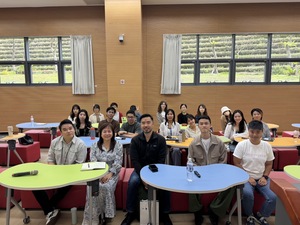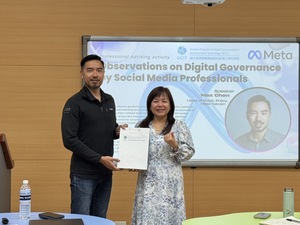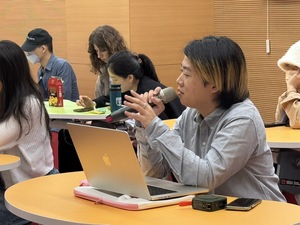GCIT Hosts Meta Taiwan Public Policy Director Max Chen: Insights on Digital Governance and Social Media Challenges



【Article by GCIT】
As artificial intelligence, the metaverse, and digital platforms continue to evolve, social media governance and online content regulation have become critical issues in global public policy. On March 3, the Master’s Program in Global Communication and Innovation Technology (GCIT) at National Chengchi University hosted Max Chen, Public Policy Director at Meta Taiwan and a GCIT Advisory Committee Member, for a talk titled "Observations on Digital Governance by Social Media Professionals". During this session, Chen engaged with students on the role of social media in digital governance and shared insights from his extensive experience in government affairs and public policy.
From Government to Tech: The Transformation of Policy and Governance
Max Chen has been dedicated to promoting technological innovation and digital governance. Before joining Meta, he served as the head of international affairs for the New Taipei City Government and held positions at Taiwan’s Ministry of Foreign Affairs and Presidential Office, focusing on sustainability and international affairs. His academic background includes international relations and technology law, and he has been recognized as a Bucerius Global Governance Fellow (2011) and an Atlantic Council Millennium Fellow (2017).
Reflecting on his career transition from diplomacy to the tech industry, Chen highlighted how social media platforms have become key players in global governance. Drawing from his experience in both central and local government, he underscored how policymakers and tech companies influence each other in shaping digital governance.
He particularly emphasized the evolving relationship between governments and social media platforms. In Taiwan, the government has demonstrated a strong commitment to tackling misinformation and disinformation, working closely with social media companies to counter digital threats. For example, during the 2019 elections in Taiwan, Meta collaborated with the government and third-party fact-checking organizations to implement the Coordinated Inauthentic Behavior (CIB) policy. This initiative aimed to curb the spread of deceptive information, enhance election transparency, and raise public awareness about the authenticity of online content.
Navigating Global Tech Governance: From Election Security to the Digital Services Act
Discussing landmark cases in social media governance, Max Chen analyzed the 2018 Cambridge Analytica scandal and its far-reaching impact. He explained how Meta adjusted its content moderation and policy oversight mechanisms in response to the controversy, which exposed the significant influence of social media on elections worldwide. The incident prompted tech companies to assume greater responsibility for transparency in political advertising and information dissemination.
Addressing major elections such as the 2020 U.S. presidential election and the 2024 Taiwan presidential election, Chen emphasized Meta’s continued efforts to enhance content moderation, establish partnerships with third-party fact-checkers, and collaborate with governments and academic institutions to counter local and international information manipulation.
Generative AI and the Future of Tech Governance
The rise of artificial intelligence (AI) and generative content (Gen AI) has introduced new challenges to digital governance. Chen highlighted Meta’s ongoing initiatives, including development of watermarking technology to label AI-generated images, videos, and audio. This approach aims to help users identify the sources of digital content and mitigate the spread of misleading information. Additionally, Meta is working with various enterprises and research institutions to formulate AI governance frameworks, reducing the societal impact of synthetic content.
Global Trends in Digital Governance
During the Q&A session, GCIT students actively engaged in discussions on topics ranging from the Digital Services Act (DSA) and its implications for social media platforms to how AI technology is transforming misinformation regulation. Many students expressed particular interest in how Meta balances government regulation and freedom of speech.
Regarding the Trusted Flaggers mechanism under the EU’s Digital Services Act (DSA), Chen acknowledged its potential to enhance platform oversight but also pointed out concerns that such policies could inadvertently become tools for government intervention in social media content. He stressed the importance of continuous evaluation to ensure a fair balance between regulation and digital rights.
In closing, Chen encouraged students to stay engaged in digital policy discussions, emphasizing that digital governance is a constantly evolving field closely intertwined with social media development and policy-making. He urged future professionals to cultivate interdisciplinary thinking to navigate the opportunities and challenges of the digital world. Through this dialogue, students gained deeper insights into how social media influences global digital policies and a clearer understanding of emerging trends in digital governance.
[此中英文稿和圖片以及全球傳播與創新科技碩士學位學程均獲得中華民國文化部的補助。]


 Fax:886-2-29379611
Fax:886-2-29379611